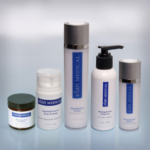Have you noticed darker than normal patches on your face, asks London skin expert

The DermaActives hyperpigmentation programme from Elan Medical Skin Clinics
During the summer months, keep an eye out for patches of darker-than-normal skin that can develop on the cheeks, forehead, upper lip, nose, chin and jaw, and sometimes the neck and forearms.
London skin expert, Sue Ibrahim from Elan Medical Skin Clinics in central London and Rayleigh, Essex explains that the condition is called melasma and it’s a common skin complaint that affects women and men.
Melasma is when brown or greyish pigmentation appears on the face, the exact cause of which is not known. But rest assured that it is not contagious, not due to an allergy and is not cancerous. It is not itchy or sore, so if you have a raised rash that is, please seek further advice immediately.
Melasma is more noticeable in the summer and often improves during the winter. Several factors can contribute to the skin disorder, such as pregnancy, hormonal drugs such as the pill, medical conditions that affect hormone levels, the use of sunbeds and exposure to the sun.
Although the condition is harmless, it can be upsetting and can affect people’s quality of life. If you would like to talk to an nurse consultant in dermatology about what can be done to help, look no further than Sue Ibrahim, who has more than 30 years of experience in skin conditions.
How can Elan Medical Skin Clinic help?
Sue, our award-winning nurse consultant in dermatology uses a highly effective treatment programme to reduce the signs of photodamage and ageing that result in fine lines, age spots, skin laxity, an uneven, dull complexion and hyperpigmentation.
The DermaActive Hyperpigmentation Programme of 5 products contains highly effective ingredients that will help lighten the hyper-pigmented patches in the upper layers of your face and neck. This programme can be purchased on our website and contains DermaActive Cleanser, DermaActive Exfoliator, DermaActive Serum, DermaActive Cream and DermaProtect Day Cream with SPF 50.
The DermaActive Melasma Programme contains prescription only creams that help clear pigmentation in the deeper layers of the skin. These creams also inhibit the production of pigment in pigment-producing cells. Due to the prescription only element, this system can only be purchased following a face-to-face skin consultation.
Here’s a testimonial from one of our clients:
Skin affected by melasma darkens more than the surrounding skin with exposure to sunlight, so sun-avoidance and sun-protection are important. The most important thing you can do if you have melasma is to protect your skin from sunlight exposure. It is also important to avoid the use of sunbeds.
Not sure if you have melasma? Why not complete our online Skin Assessment? You are welcome to contact us for more information or to book a dermatology consultation. We look forward to hearing from you.
